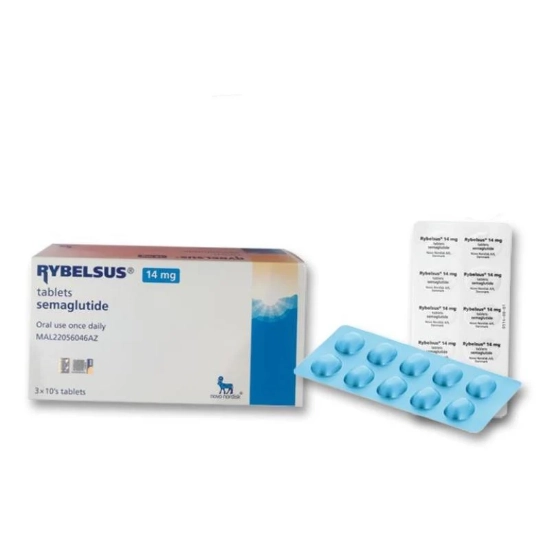
Rybelsus tablets have emerged as a groundbreaking option for people living with type 2 diabetes. As the first and only GLP-1 receptor agonist in an oral tablet form, Rybelsus offers the benefits of effective blood sugar control with the convenience of a once-daily pill. Unlike traditional injectable treatments in the same class, Rybelsus tablets provide a needle-free alternative that fits seamlessly into most routines, helping improve compliance and results for many patients.
What Are Rybelsus Tablets?
Rybelsus tablets contain the active ingredient semaglutide, a glucagon-like peptide-1 (GLP-1) receptor agonist. This compound mimics the action of the natural GLP-1 hormone that stimulates insulin release in response to high blood sugar. GLP-1 receptor agonists also help slow gastric emptying and reduce appetite, which makes them valuable in not only controlling blood sugar but also assisting with weight management.
Manufactured by Novo Nordisk, Rybelsus tablets were approved by the U.S. FDA in 2019 and have since become widely used across various healthcare systems worldwide. The medication is available in different strengths—3 mg, 7 mg, and 14 mg—with dose escalation typically guided by a healthcare provider based on individual needs and tolerability.
How Rybelsus Tablets Work
Rybelsus tablets work by mimicking the activity of the GLP-1 hormone. Once absorbed in the body, semaglutide activates the GLP-1 receptors, stimulating insulin secretion in a glucose-dependent manner. This means insulin is only released when blood sugar levels are elevated, minimizing the risk of hypoglycemia when used alone.
The medication also suppresses the release of glucagon, a hormone that increases blood sugar levels, especially after meals. By reducing gastric emptying, Rybelsus tablets contribute to a feeling of fullness, leading to reduced food intake. This multifaceted mechanism of action addresses key problems associated with type 2 diabetes, including hyperglycemia and obesity.
Benefits of Rybelsus Tablets
One of the biggest advantages of Rybelsus tablets is their oral formulation. Before Rybelsus, all GLP-1 receptor agonists had to be injected, which deterred many patients from initiating or continuing therapy. Now, patients who are averse to injections have a powerful treatment option that’s easy to take.
Clinical trials have shown that Rybelsus tablets significantly lower HbA1c levels and help many patients achieve better glycemic control. In addition to blood sugar reduction, many users also experience weight loss, which is especially important for individuals with type 2 diabetes, as obesity often complicates disease management.
Another benefit is cardiovascular protection. In large studies involving people with type 2 diabetes at risk of heart disease, semaglutide has demonstrated a potential to reduce the risk of major cardiovascular events. While the tablet form of semaglutide is still under evaluation for this benefit, the results are promising.
Dosage and Administration
Rybelsus tablets should be taken once daily, preferably in the morning, with a small amount of water (no more than 4 ounces), at least 30 minutes before eating, drinking, or taking other oral medications. This specific administration is crucial for optimal absorption, as semaglutide has low oral bioavailability and must be taken on an empty stomach.
Patients typically begin with a 3 mg dose for the first 30 days to allow the body to adjust to the medication. After that, the dose is usually increased to 7 mg and can be further increased to 14 mg if additional blood sugar control is needed. It is essential to follow a healthcare provider’s instructions during dose escalation.
Potential Side Effects
Like all medications, Rybelsus tablets may cause side effects. The most common adverse effects are gastrointestinal in nature, including nausea, vomiting, diarrhea, and constipation. These symptoms are usually mild to moderate and tend to decrease over time as the body adapts to the medication.
Less common but more serious side effects include pancreatitis, kidney problems, and allergic reactions. Rybelsus tablets should not be used in patients with a personal or family history of medullary thyroid carcinoma or in those with Multiple Endocrine Neoplasia syndrome type 2, as semaglutide has been associated with thyroid C-cell tumors in animal studies.
Rybelsus Tablets vs. Injectable GLP-1 Therapies
While injectable semaglutide (Ozempic) and other GLP-1 receptor agonists like liraglutide (Victoza) are well-established, Rybelsus tablets offer a unique advantage in convenience and patient preference. Many people find it easier to take a pill than administer an injection, especially when starting a new medication.
However, it’s important to note that injectable forms may provide slightly more robust glucose and weight loss effects, especially at higher doses. The choice between oral and injectable GLP-1 therapies should be based on individual health goals, lifestyle, and tolerance, and always decided in consultation with a healthcare professional.
Rybelsus Tablets and Weight Loss
Though Rybelsus tablets are not officially approved for weight loss, many users experience a reduction in body weight as a secondary benefit. The appetite-suppressing effect of semaglutide, along with delayed gastric emptying, leads to reduced caloric intake.
This can be particularly advantageous for individuals who struggle with weight-related complications of diabetes. Patients interested primarily in weight loss might be prescribed other forms of semaglutide at higher doses, such as Wegovy, which is FDA-approved for obesity management.
Who Should Use Rybelsus Tablets?
Rybelsus tablets are intended for adults with type 2 diabetes who need to improve their blood sugar levels along with lifestyle changes such as diet and exercise. The medication is not suitable for patients with type 1 diabetes or diabetic ketoacidosis.
It may also be a valuable option for patients who have not achieved their glycemic targets with metformin alone or those who cannot tolerate injectable medications. Because of its weight-reducing effects, it may also benefit those who are overweight or obese and require additional metabolic support.
Precautions and Interactions
Patients taking Rybelsus tablets should inform their healthcare providers about all other medications they are using, especially insulin or sulfonylureas, as combining these drugs can increase the risk of hypoglycemia. Alcohol use, kidney issues, and digestive disorders should also be discussed, as they can influence the medication’s safety and effectiveness.
Pregnant or breastfeeding women should avoid using Rybelsus unless explicitly directed by a physician. The long-term effects on fetal development are not fully known, and the drug should be discontinued at least two months before a planned pregnancy.
Conclusion
Rybelsus tablets represent a significant advancement in the treatment of type 2 diabetes by offering powerful blood sugar control in a convenient oral form. With proven effectiveness in lowering HbA1c and aiding weight loss, this medication provides a versatile option for those seeking a non-injectable therapy. While side effects and precautions must be considered, the benefits of improved glycemic control and enhanced patient compliance make Rybelsus tablets a promising addition to modern diabetes care. Always consult with a qualified healthcare provider to determine if Rybelsus tablets are the right choice for your treatment plan.






